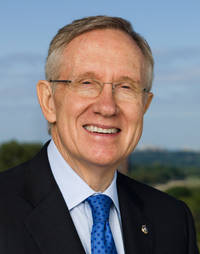Sun Archives
- Nevada politicians key to U.S. push for Internet gaming (4-15-2011)
- D.C. to offer Internet gambling, becomes first in the nation (4-12-2011)
- Assembly panel OKs amended online gambling bill (4-21-2011)
- Lawmakers weigh bill to bring online poker to Nevada (3-24-2011)
- Wynn announces partnership to expand Internet gambling (3-24-2011)
- Internet poker company looks to Nevada for entry into U.S. (3-21-2011)
- Bill would set regulations for Internet poker (3-10-2011)
- NV considers Internet poker bill, but casinos balk (3-10-2011)
- Board OKs Caesars Entertainment ties with foreign Internet gaming company (3-9-2011)
- All bets off: Online poker bill dealt possible death blow (12-17-2010)
- Legalizing online poker looks like a long shot (12-9-2010)
- Harry Reid rushes effort to legalize Internet poker (12-7-2010)
- Harry Reid pushes bill to allow for online gambling (12-3-2010)
- Nevada gaming companies see potential flush online (8-2-2010)
- Online gambling is illegal, but betting sites’ logos often in Nevada casinos (7-13-2010)
- Question evolving from legalization debate: How to tax online casinos?(5-24_2010)
- Lawmakers push to regulate, tax online gaming (5-19-2010)
- With aggressive push, Internet gambling again in play (2-9-2010)
Reader poll
Sun Coverage
A decade ago, Nevada regulators passed on an opportunity to draft Internet gambling regulations to avoid running afoul of the Justice Department, which has long declared all forms of online gambling illegal.
Ten years later and with three relatively new decision-makers at its helm, Nevada’s Gaming Control Board is changing course on a fast-moving political and economic landscape that could see Congress approving Internet wagering.
Adopting regulations before other states do could give Nevada a leg up in cultivating an Internet gambling industry serving state residents as well as customers across the United States, Control Board Chairman Mark Lipparelli said.
“The governor and I and others believe that Nevada needs to be properly positioned and embarking on this regulatory process,” he said.
The board is working on regulations that might not be adopted until Congress has approved Internet gambling on a federal level, he said. If Congress fails to act, states could go it alone with their own regulations as long as the online wagering occurs within a state’s borders, he said. States that greenlight Internet gambling could end up with compacts that enable them to share customers and gambling winnings similar to the way lotteries spread nationwide, he added.
By developing the regulations, the board would be picking up where it left off in 2002 after the Nevada Legislature granted it that authority. Lawmakers were putting Nevada first in line to reap a tax windfall should the federal government approve Internet gambling. Such hopes faded with the Justice Department’s unwavering stance against online wagering, while multiple efforts to pass regulation bills through Congress fizzled. Conservative Republicans muscled through legislation in 2006 further criminalizing Internet gambling.
In recent years, lawmakers and regulators have become more receptive to online wagering as a legitimate, potentially lucrative industry.
Lately, multiple states including California, Florida, New Jersey and Iowa have considered legalizing and taxing Internet gambling to raise needed revenue. Last month, Washington, D.C., became the first U.S. jurisdiction to allow Internet gambling — a move proponents hoped would prod the feds into opening a national market for Web casinos.
Jan Jones, Caesars Entertainment senior vice president of communications and government relations, said it makes sense for Nevada to take the lead in adopting strong regulations that can be enacted quickly on the back of congressional action.
“With all the noise that’s out there in the marketplace, both at the state and federal levels, being prepared is imminently logical,” she said.
Despite failed efforts to regulate Internet gambling at the federal level, Jones said such prospects have improved in the wake of the federal indictments last month of online poker giants PokerStars, Full Tilt Poker and Absolute Poker. “You’ve got millions of poker players who’ve been left with no idea where to play (online),” she said.
A federal bill prohibiting Internet gambling yet exempting online poker could appease gambling opponents who fear a wave of state regulations opening the door to more forms of online gambling than poker, Jones said.
Caesars, which owns the World Series of Poker brand, has led Internet gambling lobbying efforts by Nevada companies in Congress.
Nevada’s casino giants seek to enter the Internet poker market, which they believe would grow rather than cannibalize their brick-and-mortar gambling businesses.
U.S. Sen. Harry Reid joined their cause last year in introducing a short-lived bill that would have given Nevada and New Jersey regulators, along with the federal government, the responsibility of vetting Internet gambling enterprises.
“It’s inevitable that legislation will be reconsidered by Congress,” said Las Vegas attorney Tony Cabot, who has represented Internet gambling companies.
Although federal regulation would probably be limited to Internet poker, Cabot said he envisions individual states pressing for regulations governing house-banked casino games online such as slot machines, blackjack and baccarat.
Although poker requires a large customer base to make money for the casino, other kinds of casino games can be profitable no matter how small a state’s population, Cabot said.
“There’s a strong business plan for remote gambling on house-banked games of chance and sufficient numbers of people willing to risk their capital to make it work,” he said.
Regulators and corporations look to Europe as a region that has developed the best practices for regulating and monitoring Internet gambling within and between individual countries, he said.
“We’re starting to see some conformity in the regulations in terms of technical standards, licensing and issues involving problem and underage gambling,” Cabot said.
Over the years, Nevada regulators have indicated that monitoring casinos in cyberspace would be a monumental — although potentially achievable — task.
Nevada has moved closer toward Internet gambling in recent months by allowing sports betting on smartphones — systems that require gamblers to open up betting accounts in person and will pinpoint the gambler’s location to within a few feet of the state’s borders.
The regulation process in Nevada won’t necessarily be a slam dunk for companies wanting a first crack at a business some estimate in the hundreds of millions of dollars.
Gaming regulations normally take several months to draft and circulate publicly. The Control Board typically holds several public workshops where casinos and the community can weigh in or object to draft regulations that would require a vote by the Nevada Gaming Commission, a five-member body separate from the board.
Just like land-based casinos, online operators must show that their systems are safe and secure from hackers, cheats and underage gamblers.

